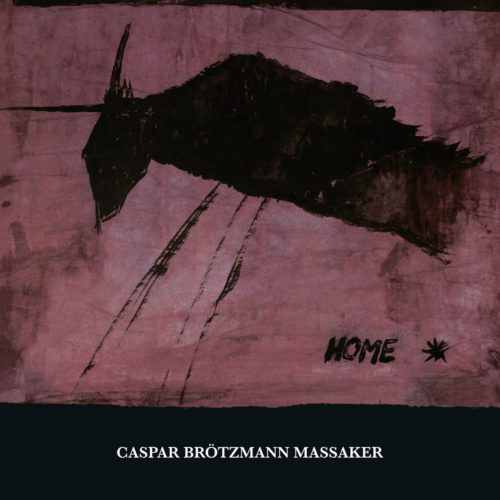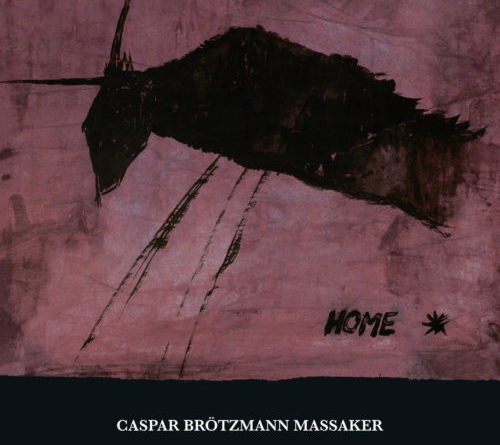ALBUM REVIEW: Home (Reissue) – Caspar Brötzmann Massaker
Caspar Brötzmann is a virtuosic guitarist from Wuppertal, Germany. His father, Peter Brötzmann, is a renowned free-jazz saxophonist who was peripherally involved with the highly-influential Fluxus movement. He was introduced to his instrument by Hans Reichel, a prolific improvisational guitarist and experimental luthier. Given his background, making conventional rock music was simply never an option for Caspar Brötzmann. His distinctive approach to the guitar is at once highly technical and wildly experimental, operating the fretboard as a means of extracting harsh and distorted sounds from his amplifier with surgical precision.
The CASPAR BRÖTZMANN MASSAKER – a power trio comprising Brötzmann, bassist Eduardo Delgado-Lopez, and a carousel of drummers – provides a rock-orientated foundation for his semi-improvised playing. The group produced a series of five albums between the late eighties and mid-nineties which have, until very recently, remained obscure and out-of-print. Last year Southern Lord Recordings, highly-regarded purveyors of heavy experimentalism, reissued the first four CASPAR BRÖTZMANN MASSAKER records, and at last Home has now been made available for the first time in twenty-five years.
All of the pieces which appear on Home also appear on earlier releases. The Tribe and Massaker both appear on 1987’s The Tribe, while Tempelhof, Hunter Song and Böhmen each appear on 1989’s Black Axis. Yet, make no mistake, Home is no mere greatest hits album: each piece has been re-recorded and extended, honed through years of live performance. The album was recorded at Steinschlag Studio in Mauren, owned by EINSTÜRZENDE NEUBAUTEN percussionist F. M. Einheit, and produced by Bruno Gebhard, who would go on to work with Krautrock royalty FAUST. The recording equipment was assembled in a derelict swimming pool outside, while the band performed live on the roof of the house: accordingly, Home is drenched in natural reverb, approximating many of the acoustic features of a live album. For all that, it’s a wonder Home sounds as perspicuous as it does. Dread and discomfort predominate, with sparse reprieve from the mechanical rhythm and saturated walls of sound.
Brötzmann’s style emphasises timbre above all else. The band explore primitive musical ideas at length, using repetition and compositional minimalism to allow the interaction between the guitar’s pickups and the amplifier to become the focus of a piece. The riff of opening number The Tribe demonstrates the rich potential afforded by the interactivity of dissonance and feedback, while Tempelhof exudes Hendrix–esque swagger through distortion and phasing.
Centrepiece and theme Massaker, meanwhile, shows the guitarist at his improvisational best: sixteen minutes of near-formless solo performance working its way towards a frenzied plateau of sonic sadism. Hunter Song and Böhmen, comprising the album’s B-Side, recapitulate what has come before them for any listeners left hungry for more. Brötzmann’s disciplined technique allows him to deploy incidental effects with accuity, and this sets the group apart from their peers.
While you might have found the CASPAR BRÖTZMANN MASSAKER’s primitive percussive bludgeoning on SWANS’ Filth, or it’s swinging heaviness on MELVINS’ Gluey Porch Treatments, you wouldn’t have found anything like Brötzmann’s considered approach to tonal violence anywhere else at the time. Home is no mere artefact or historical document, though. A lot of experimental music is nigh-on unlistenable, that’s just the nature of the beast, but with Home the CASPAR BRÖTZMANN MASSAKER struck a compelling balance between pretense and playfulness, aptitude and accessibility. Well-deserving of rediscovery, those looking for a nuanced approach to brutality will surely find a home here.
Rating: 9/10

Home (Reissue) is out now via Southern Lord.
Like CASPAR BRÖTZMANN MASSAKER on Facebook.

